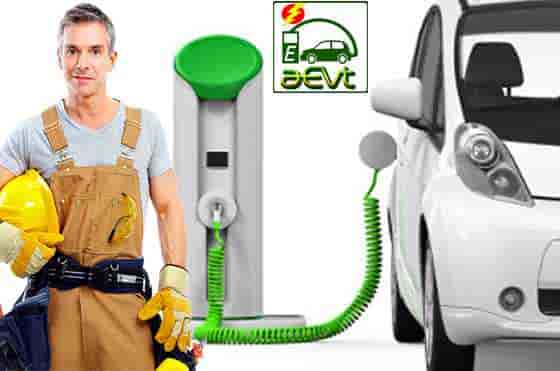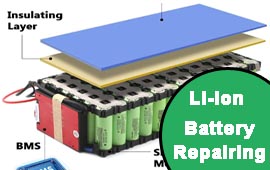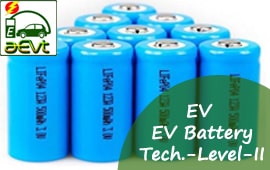Electric Vehicle Course Categories
- Master Degree
- PG Course
- Startups/Business Course
- Job Course
- Research and Development
Masters Degrees (Electric Vehicles)
| Program Title | University | Duration |
|---|---|---|
| Master in Electric Vehicle Engineering | Sweden’s leading university | one-year programme |
| MSc Mobility Engineering | Politecnico | 2 years |
| MSc Automotive Engineering for Electric Vehicles | University of Bedfordshire | 1 yera |
| PG Program in Electric Vehicle Powertrain | Joint program with UPES and Academy of EV Technology | 10 Months |
| Certificate in EV Technology | Joint program with UPES and Academy of EV Technology | 3 Months |
Startups/Business Course
| Program Title | Offered by | Duration |
|---|---|---|
| EV EVSE Business Management Course for Entrepreneurs | Academy of EV Technology | one Month |
| Lithium-ion Battery Pack Assembly Line | Academy of EV Technology | One Month |
| Electric Vehicle Charging Station Design, Installation | Academy of EV Technology | 1 Month |
| Program Title | Offered by | Duration |
|---|---|---|
| PG Program in Electric Vehicle Powertrain | Joint program with UPES and Academy of EV Technology | 10 Months |
| Certificate in EV Technology | Joint program with UPES and Academy of EV Technology | 3 Months |
Find EV EVSE course
Electric vehicle (EV) industry
All-electric vehicles (EVs), also referred to as battery electric vehicles, use a battery pack to store the electrical energy that powers the motor. EV batteries are charged by plugging the vehicle in to an electric power source.
The key components are
Battery : Which has the stored energy
Motors : Which converts this into rotational energy for mobility.
Controller : Is an electronic hardware device +software which works very closely with the motor and is usually bundled with. A motor controller might include a manual or automatic means for starting and stopping the motor, selecting forward or reverse rotation, selecting and regulating the speed, regulating or limiting the torque, and protecting against overloads and electrical faults.
The motor of an electric car converts the current from the battery into mechanical energy. This is done by a fixed magnetic part (stator) and a moving part (rotor) that is made magnetic by electricity. If two positive poles are facing each other due to the electrical charge, they repel each other - and the moving part of the electric motor rotates.
Electric motors develop similar torque at low as well as at high speeds. Theoretically, therefore, a rigid connection between the motor and the drive shaft would suffice for them. In practice, however, an input gearbox is usually used as a so-called reduction gear, which reduces the speed of the motor by a factor of about 1:10.
The motor of an electric car consists of two electromagnets - stator and rotor. The stator is immobile and generates a constant magnetic field with the help of direct current. The rotor is rotatable and produces its magnetic field with alternating current. The two magnets alternately attract and repel each other. The rotor rotates - and thus sets the car in motion.
The inverter is also called a converter. This is because it has the task of converting the 3-phase AC voltage of the electric motor into a DC voltage for charging the battery when braking. Conversely, when the electric motor is driven, the battery's DC voltage is converted into a 3-phase AC voltage.
EV & EVSE MSME Development Knowledge

EV EVSE Business Management for Entrepreneurs
India to become a manufacturing hub for electric vehicles in five years. Indian EV industry to represent Rs 500 billion opportunity by 2025.This Techno Commercial knowledge: Throughout this session, AEVT bridges the needs of startups so that candidate can understand the technology from basic of EV to EVSE equipment like Lithium-ion battery, Battery pack assembly process, EV Motor, Charger, charging station development and all others parts/ equipment's calculation, selection, building a Legal Foundation, Understanding Finance Basics, Business Planning and Fundraising.
Today's Offer: FLAT 18% discount for online Session
Lithium-ion batteries are the heart of our electric cars. They are particularly powerful and have the highest energy density compared to other batteries. This means that they can store the most energy per kilogram of battery. Lithium-ion batteries have numerous advantages: due to their compact size, more individual lithium-ion batteries fit in your Opel electric car. So you can travel further. They also require less energy to cool the vehicle battery to its optimal operating temperature.
Also good to know: our batteries are not affected by the so-called "memory effect". You can recharge your electric vehicle battery as often as you like - even through mobile fast charging - without any loss of performance.
Independent studies estimate that you can drive 250,000, even up to 500,000 km with the battery of an electric car1. The durability of our batteries is therefore probably on a par with that of our combustion engines. That's why we give an 8-year guarantee on our electric car batteries, or 160,000 km of driving.
Lithium-ion Battery pack assembly
Practical skills - cell sellection, cell IR testing, cell balancing, charge discharge testing, module & pack assembling, enclosure selection, all machinery selection, assembly line planning and layout drawing, costing of assembly line, working capital, investment, ROI, business projection making, different product design.
Get the knowledge of Lithium-ion cell parameters, Cell Chemistry, Cell Architecture, Thermal Management, BMS and battery pack assembly technical and commercial detail before setup assembly line.
Today's Offer: FLAT 18% discount for online session
Lithium-ion battery sector
The market for battery swapping services in India is bifurcated at present, with different players incorporating diverse battery types for various kinds of vehicles. Locating suitable charging infrastructure and connections may be challenging in the aftermath of the stated measure. As a result of the utilisation of sub-standard batteries, there have also been occurrences of fires at battery-switching facilities.
In 'white gold' rush, India kick-starts talks with lithium-rich nations
Jammu and Kashmir's reserve might be present with a large amount of lithium, but the current amount is insufficient to match with the world's top reserves of Lithium. For India to become self-reliant in the field of solar energy storage and EV manufacturing without being dependent on China for EV battery supplies, it is important to own more such Lithium reserves and enhance its presence in overseas lithium mines. Solar lighting system operates on electricity from batteries, charged through the use of solar photovoltaic panels. It is composed of a battery, solar panel, LED lamp, and charge controller. The stored energy is collected in a rechargeable Lithium-ion battery used later to produce lighting at night. The rapid infrastructure development in all sectors of India is pushing local solar light manufacturers to compete and deliver innovative solar lighting products at low prices to increase their presence in the market.
Start Lithium Ion Battery Pack Manufacturing Business
Drone batteries specially optimized for fast charging or delivering particularly high power loads.
Local Lithium-ion battery production is expected to lower the cost of electric vehicles soon.
Continuous developments in lithium battery technology, however, are making agricultural electrification much more attainable.
Agricultural machinery and equipment manufacturers have already begun seizing these opportunities for small- to medium-sized equipment, and this usage will only expand in the coming years.
This means entrepreneurs have great potential to start their lithium-ion battery businesses. The whole process may seem simple, but knowledge and skill required,
like
1. be sure you understand how batteries are made
2. selected which market segment best to enter
3. licenses, permissions, or approvals required for operating a battery factory and many more …
Through all of the potential knowledge and skills, you can be better prepared for whatever comes your way.
Transition to green energy & net zero future is dependent on the availability of key elements such as Cobalt, Lithium, Nickel, Manganese and Graphite, Not just India but the world is deficient looking to the looming demand in near future. sustainable Li-Ion battery recycling is the missing link in the battery supply chain.
Know the eco-friendly recycling competence and know-how that can provide a substantial quantity of these metals to Indian industry as well as internationally for manufacturing of Lithium-Ion Battery.
Government's Strategic Move to Enhance Bharat's Battery Energy Storage
In a significant development aimed at bolstering India's renewable energy sector, the Union
Cabinet has given its nod to a ₹3,760 crore Viability Gap Funding (VGF) initiative dedicated to
battery energy storage systems (BESS). The move holds tremendous promise for the renewable
energy industry, as it seeks to address the intermittent power generation issues associated with
green energy sources.
India is planning to invite bids for an 80 billion rupees ($960 million) incentive program for production of electric vehicle batteries, according to people familiar with the matter.
The demand for batteries is expected to rise to 260 gigawatt hour by 2030, catering to a growing market of electric vehicles, grid-scale energy storage and consumer electronics, according to a report published by research center RMI India and the government’s think tank Niti Aayog.
India's Parliament passed a law allowing the government to auction and mine its newly-discovered reserves of lithium, among other minerals, increasing the mining of the critical raw material for electric vehicle batteries.
Battery Business in India
Before starting a battery business in India, it is important to do market research and learn about the technology and your competitors. What your customers are looking for, whether or not the product is in demand, and if your company has the means of producing or distributing in in large volumes - these are all important points to be considered. Required heavy-duty lithium-ion batteries for the construction, agricultural & mining industries.
lithium battery pack solutions for medical applications
Designing and manufacturing lithium battery pack solutions for medical applications, identify the appropriate lithium chemistry, combined with a properly designed Smart Battery Management System (BMS) that meets the specific needs of medical devices. Many medical device developers now work with Lithium Power, as their professional medical lithium battery maker rather than trying to develop their own battery solution in-house. Working on the technical challenges of integrating the battery power in the way that best promotes performance and safety.
Lithium-ion Battery pack assembly
Practical skills - cell sellection, cell IR testing, cell balancing, charge discharge testing, module & pack assembling, enclosure selection, all machinery selection, assembly line planning and layout drawing, costing of assembly line, working capital, investment, ROI, business projection making, different product design.
Get the knowledge of Lithium-ion cell parameters, Cell Chemistry, Cell Architecture, Thermal Management, BMS and battery pack assembly technical and commercial detail before setup assembly line.
Today's Offer: FLAT 18% discount for online session
EV Lithium-ion Battery Repair and Maintenance

The average electric vehicle lithium-ion battery can retain up to 70% of its charging capacity after being removed. The business proposition for second-life batteries is therefore intuitive
The second life market looks set to boom in the coming years as EV uptake grows.
Today's Offer: FLAT 18% discount for online class
Quick Inquiry Form

Interactive Session

Practical & Doubt Session

E-Library Study Materials

Online Evaluation


